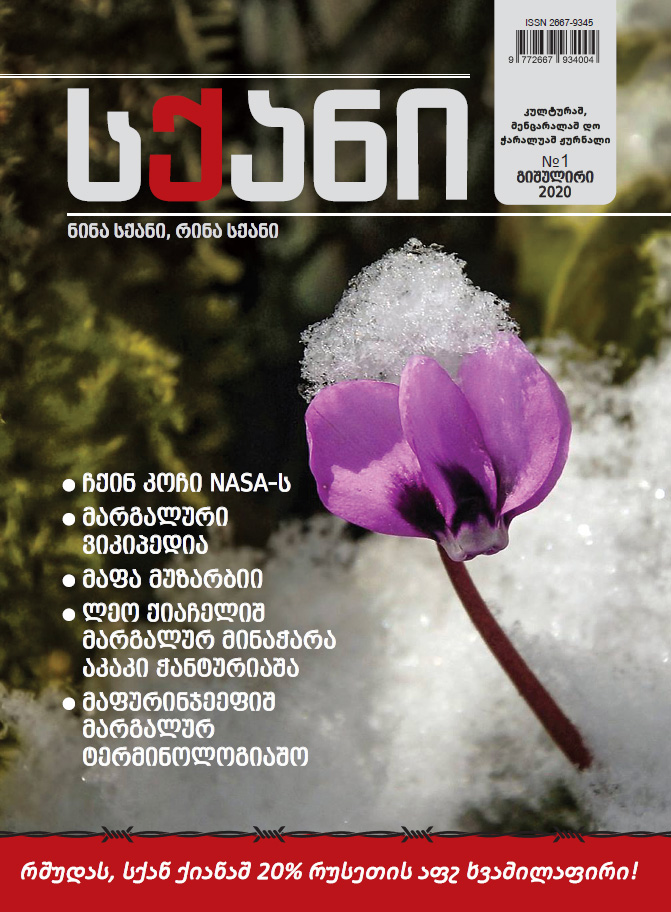
Georgia is home to 11 languages on the brink of extinction — including Mingrelian and Svan. Despite survey data suggesting there are hundreds of thousands of native speakers of these languages, fears of nationalism are holding back efforts to save them.
On 21 February, Georgia celebrates International Mother Tongue Day, a day established by UNESCO to promote ‘linguistic and cultural diversity and multilingualism’.
Georgia is home to at least 11 languages on the brink of extinction, according to UNESCO. The Ministry of Education now offers classes to ethnic minority students in several small languages.
This suggests that the state recognises the need to preserve smaller tongues, although, what languages need to be protected seems to be selective.
Three out of 11 languages that made it to the list of endangered languages are part of the Kartvelian linguistic family, which is closely related yet not mutually intelligible with standard Georgian.
Two of them — Mingrelian and Svan — are mainly spoken in parts of Western Georgia, while Laz is native to the Northeastern Black Sea region of Turkey. None of these languages have standardised literary forms or strong written traditions.
Until now, there was only a rough sense of the extent to which Mingrelian and Svan are spoken in Georgia, as the government does not tally speakers of these tongues. Data from the 2019 Caucasus Barometer shows that these languages are still in use, albeit as colloquialisms.
In the Caucasus Barometer survey, about 8% of Georgians named Mingrelian as the language which they use in everyday situations.
Fewer respondents named Svan; on average, 3% of Georgia’s population uses it to converse with family members, friends, or colleagues.
Estimates for different settlement types are much less reliable due to relatively small sample sizes. For instance, the proportion of Mingrelian speakers in Tbilisi is somewhere between 1%–7%. The same goes for those who speak Mingrelian in urban areas — the data puts estimates between 5%–16%.
Still, the Caucasus Barometer survey shows that about 400,000 Georgians still use minor Kartvelian languages in everyday situations.
Fears of separatism
Despite the number of native speakers in Georgia, neither Mingrelian nor Svan is recognised legally. None of the documents listed on the government’s official document repository, matsne.gov.ge, mention Mingrelian or Svan languages.
As noted above, there are no official statistics on the number of speakers. The last census recording speakers of Mingrelian and Svan was the 1926 Soviet census.
The unclear status of these languages is illustrated by the anecdote of one Tbilisi resident who tried to register Mingrelian as his mother tongue in the 2014 National Census. According to an interview he gave to RFE/RL, census officials fiercely denied his request.
To a large extent, fears of separatism nurture these sentiments. A long-standing, popular opinion views recognition of the Mingrelian (and Svan) language as a potential source of increased separatist sentiments in these regions.
These attitudes seemingly contribute to the Georgian government’s reluctance to ratify the European Charter for Regional or Minority Languages (ECRML). Sanctioning the document might oblige the country to recognise the existence of Mingrelian and Svan and to ensure their protection.
While the charter underscores that it should not be interpreted as a threat to the status of official languages, some in Georgia believe to the contrary.
Tbilisi’s worries of separatism are further exacerbated because the authorities of secessionist Abkhazia have encouraged the use of Mingrelian among Abkhazia’s ethnic Georgian population, even sponsoring a TV station broadcasting in Mingrelian language.
Despite such worries, the creation of a separate Mingrelian or Svan political entity has never enjoyed much popularity in Georgia, even among speakers of these languages.
When autonomist movements emerged in the 1920s and 1930s amid Stalin’s korenizatsiya policy, the leadership of Soviet Georgia (including Lavrenti Beria, a Mingrelian himself) immediately curtailed them.
Only fringe groups are currently advocating for political autonomy for Samegrelo. To the author’s knowledge, there has been no known group seeking political status for Svaneti.
Language activists step in
Activists in Georgia have continued to push for the preservation of Mingrelian and Svan languages — despite the government’s reluctance to do so themselves.
There is a Mingrelian version of Wikipedia with about 10,000 articles. Books are printed and literary competitions are held in Svan.
Most recently, the Association for the Preservation of the Mingrelian Language started publishing a magazine in Mingrelian.

Estimates from Caucasus Barometer show that at least 11% of Georgia’s population speak smaller Kartvelian languages.
However, one recent study shows that younger people in Mingrelian-speaking communities have started shedding their linguistic identity in favour of Georgian. A similar pattern is also attested to in the case of the Svan language.
In this situation, the reluctance of the Georgian state to preserve or even acknowledge the existence of Mingrelian and Svan endangers these unique languages. If this situation continues, soon there will be few if any speakers of minor Kartvelian languages left to celebrate the International Mother Tongue Day.
The views expressed in the article are the author’s alone and do not represent the views of CRRC Georgia or any related entity.
All place names and terminology used in this article are the words of the author alone, and may not necessarily reflect the views of OC Media’s editorial board.








